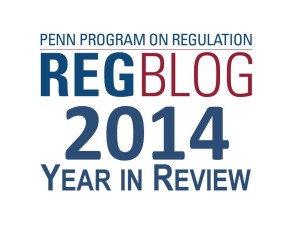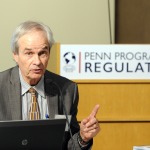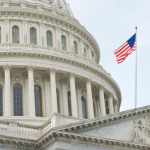
The Regulatory Review celebrates the end of 2014 by featuring our top news posts from the past year.
 As the new year arrives, The Regulatory Review would like to reflect on the many important regulatory developments and debates that occurred in the United States and around the world throughout 2014. We also want to recognize some of the excellent work we had the privilege to feature on The Regulatory Review this past year. On these last three days of this year, we are presenting the top essays published in The Regulatory Review over the past twelve months, based on the number of page views for the work appearing in each of our opinion, news, and analysis sections.
As the new year arrives, The Regulatory Review would like to reflect on the many important regulatory developments and debates that occurred in the United States and around the world throughout 2014. We also want to recognize some of the excellent work we had the privilege to feature on The Regulatory Review this past year. On these last three days of this year, we are presenting the top essays published in The Regulatory Review over the past twelve months, based on the number of page views for the work appearing in each of our opinion, news, and analysis sections.
Today we feature, in alphabetical order by author, the top news stories from 2014. Visit our “Year in Review” series main page for information about the top analysis and opinion stories.
 Making Student Loans More Affordable
Making Student Loans More Affordable
Isabel Abreu (The Regulatory Review) | November 18
More Federal Direct Loan borrowers may soon be eligible for a Pay As You Earn (PAYE) repayment plan offering lower monthly payments and the opportunity to discharge outstanding debt sooner.
 FDA Revises its Historic Proposal to Regulate Animal Food
FDA Revises its Historic Proposal to Regulate Animal Food
Isabel Abreu (The Regulatory Review) | December 16
Given that sixty-two percent of U.S. households include at least one pet, it may be surprising to learn that laws governing pet food safety were nearly nonexistent until very recently. In 2013, the FDA oposed to regulate the safety of animal food, including livestock feed and pet food. Pushback among stakeholders, however, appears to have slowed down finalization of the rule.
 The State of Inequality in America
The State of Inequality in America
Lev Breydo (The Regulatory Review) | December 2
Inequality has become “the defining challenge of our time” – a set of issues potent enough to propel a thick economics tome to the New York Times’ bestseller list. The concern is well placed. Inequality can diminish economic mobility, hinder innovation, slow economic growth, and even fray “the country’s social fabric.”
 Improving Regulatory Agenda-Setting
Improving Regulatory Agenda-Setting
Cary Coglianese (University of Pennsylvania Law School) & Daniel E. Walters (University of Pennsylvania Law School) | November 17
With a seemingly endless stream of risks demanding attention in an increasingly modern, complex economy, some of the most important decisions a regulatory agency faces are those about what problems to target.
 EPA Adopts Stricter Standards to Clean Up Auto Exhaust
EPA Adopts Stricter Standards to Clean Up Auto Exhaust
Cary Davis (The Regulatory Review) | March 26
Imagine if an individual could buy cleaner air and better health simply by paying higher prices on the car lot and at the gas pump. That is essentially the trade-off the Environmental Protection Agency (EPA) may require of the driving public with new rules on sulfur content in gasoline.
 Could Financial Services Save the Postal Service?
Could Financial Services Save the Postal Service?
Lauren-Kelly Devine (The Regulatory Review) | February 19
As the U.S. Postal Service (USPS) continues to suffer financial losses, many new proposals have emerged to provide the revenue boost the agency needs. But in recent weeks, one controversial proposal calls for allowing the USPS to bring in revenue by entering the business of postal banking.
 FTC Chair Edith Ramirez Outlines Agenda on “Big Data”
FTC Chair Edith Ramirez Outlines Agenda on “Big Data”
Marcus Epstein (The Regulatory Review) | June 11
Federal Trade Commission Chair Edith Ramirez recently gave a major speech on consumer privacy before the Media Institute, focusing on the challenges and opportunities that “big data” presents for companies and consumers.
 European Court’s Transparency Ruling May Impact Trade Talks With U.S.
European Court’s Transparency Ruling May Impact Trade Talks With U.S.
Alexandra Hamilton (The Regulatory Review) | July 17
Trade between the European Union (EU) and the United States totaled roughly $1.06 trillion last year, while investments came to about $3.7 trillion. Seeking to expand trade still further, the two powers are currently negotiating a Transatlantic Trade and Investment Partnership (TTIP).
 Supreme Court Decision Strikes Compromise in Greenhouse Gas Case
Supreme Court Decision Strikes Compromise in Greenhouse Gas Case
Alexandra Hamilton (The Regulatory Review) | June 25
“Any air pollutant.” The interpretation of this seemingly benign phrase in a federal pollution control law lay at the heart of the legal battle in a case decided … by the U.S. Supreme Court.
 EPA’s Climate Change Proposal May Alter Prospects for a Global Climate Deal
EPA’s Climate Change Proposal May Alter Prospects for a Global Climate Deal
Alexandra Hamilton (The Regulatory Review) | June 17
Two degrees Celsius. That is the maximum global temperature increase scientists believe the planet can withstand while avoiding the most devastating effects of climate change. It is also the goal agreed upon by UN members in the 2009 Copenhagen Accord.
 House Subcommittee Considers Scrubbing Away “Burdensome” Regulations
House Subcommittee Considers Scrubbing Away “Burdensome” Regulations
Brandon Kenney (The Regulatory Review) | March 6
Companies struggling to keep up with regulatory compliance requirements may soon have a lighter load, as some members of Congress have recently set their sights on reducing “unnecessarily burdensome” regulations.
 NLRB Proposes Rule to Speed Up Union Elections
NLRB Proposes Rule to Speed Up Union Elections
Brandon Kenney (The Regulatory Review) | April 29
Some employers are worried that the National Labor Relations Board’s (NLRB) newly proposed rule would allow unions to ambush companies with “quickie” elections before employees were fully informed about what unionizing would entail.
 Agency Seeks Total Monitoring of Inmates
Agency Seeks Total Monitoring of Inmates
Brandon Kenney (The Regulatory Review) | April 17
The Bureau of Prisons is seeking to expand surveillance on prisoners who pose a threat to society from behind bars. The agency recently closed the comment period on a proposed rule that would establish guidelines for sending inmates to isolated incarceration units where federal officials would monitor nearly all prisoner communications.
 USDA Proposes Lifting Longstanding Ban on Argentinian Meat Imports
USDA Proposes Lifting Longstanding Ban on Argentinian Meat Imports
Dori Molozanov (The Regulatory Review) | October 1
Northern Argentina is finally ready to start exporting meat to the United States, according to a proposed rule from the U.S. Department of Agriculture (USDA).
 Regulators Quietly Prepare to Open Chinese Capital Markets
Regulators Quietly Prepare to Open Chinese Capital Markets
Patricia Santiago (The Regulatory Review) | May 26
The China Securities Regulatory Commission (CSRC) and Hong Kong’s Securities and Futures Commission (SFC) recently approved a pilot program that will link the Shanghai and Hong Kong stock exchanges.
 Former Commissioner Speaks About SEC’s Role in Rapidly Changing Market
Former Commissioner Speaks About SEC’s Role in Rapidly Changing Market
Maho Sato (The Regulatory Review) | March 27
The past five years were the busiest in the history of the Securities and Exchange Commission (SEC) according to Troy A. Paredes, former Commissioner of the SEC, who reflected on his term during a recent seminar hosted by the Penn Wharton Public Policy Initiative.
 Federal Government Looks to Revise Home Health Care Guidelines
Federal Government Looks to Revise Home Health Care Guidelines
Kate Sell (The Regulatory Review) | October 29
Organizations that provide home health care services to the elderly and disabled may soon need to meet new requirements in order to receive Medicare or Medicaid reimbursement.
 Professor Coglianese to Lead New Initiative on Regulatory Excellence
Professor Coglianese to Lead New Initiative on Regulatory Excellence
Ryan Teitman (University of Pennsylvania Law School) | November 13
University of Pennsylvania Law School Professor Cary Coglianese has been selected by the Alberta Energy Regulator (AER) of Canada to lead a major new initiative defining and measuring regulatory excellence.
 Analyzing the Job Impacts of Regulation
Analyzing the Job Impacts of Regulation
Daniel E. Walters (University of Pennsylvania Law School) | April 15
Competing and extreme claims about the relationship between regulation and jobs pervade political debate in Washington, D.C…. Do regulations actually kill jobs?
 How Well is Obamacare Working?
How Well is Obamacare Working?
Daniel E. Walters (University of Pennsylvania Law School) | May 13
Most Americans are aware of the difficulties last year with the initial rollout of HealthCare.gov, the registration website for individuals seeking insurance coverage under the Affordable Care Act (ACA). Yet these website woes, it turns out, were just the tip of the iceberg in ACA’s implementation.
 Obama’s Regulatory Chief Speaks at Penn Law
Obama’s Regulatory Chief Speaks at Penn Law
Daniel E. Walters (University of Pennsylvania Law School) | April 30
Facing persistent legislative gridlock, the Obama Administration is seeking to achieve many of its domestic policy goals through administrative rulemaking.
 Experts Debate EPA’s Proposed Clean Power Rule
Experts Debate EPA’s Proposed Clean Power Rule
Daniel E. Walters (University of Pennsylvania Law School) | December 15
In the wake of a groundbreaking agreement between China and the United States to reduce greenhouse gas emissions, climate change action appears to be gaining political momentum in the lead-up to a major international climate meeting in Paris in 2015.
 Penn Seminar Explores New Responses to Flood Risks
Penn Seminar Explores New Responses to Flood Risks
Daniel E. Walters (University of Pennsylvania Law School) | January 21
Following Hurricane Sandy, over $75 billion in disaster relief was provided to aid the recovery process. But there are challenges in getting individuals to take steps to reduce losses prior to a disaster, and affordability issues threaten to delay the implementation of key features of reform.
Grayson Weeks (The Regulatory Review) | November 20
The Federal Reserve recently announced the end of its practice of purchasing financial assets from commercial banks—known as quantitative easing—that began as part of the Fed’s response to the 2008 financial crisis. The move represents a vote of confidence in the economy.
 SEC Expands Disclosure Requirements for Asset-Backed Securities
SEC Expands Disclosure Requirements for Asset-Backed Securities
Grayson Weeks (The Regulatory Review) | November 4
According to the SEC, market-wide failure to value asset-backed securities accurately contributed significantly to the 2008 financial crisis. To address the challenges investors face when valuing securities, the SEC has adopted a new rule to promote greater transparency and increase … access to information.




